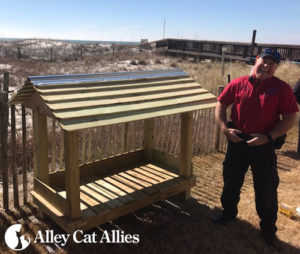What a difference a year can make. Before September 2017, officials in Orange Beach, Alabama, didn’t have a procedure in place for addressing people’s concerns about outdoor cats. Today, the city has a thriving Trap-Neuter-Return (TNR) program. The Orange Beach Animal Care and Control Program (OBACCP) has spayed or neutered more than 150 cats and kittens and adopted out at least 30 to date. The amazing turnaround is due to the hard work of Tom Conerly, Orange Beach’s newest animal control officer.
Conerly, a former military colonel, began his work with TNR in January 2017 after he and his wife spotted three kittens in their driveway. Three kittens became five, and then nine. Conerly knew something had to be done. Orange Beach could not help, so Conerly, with help from nearby Fairhope Cat Coalition, did TNR for his colony and for the 14 community cats cared for by another resident. Armed with this experience, he “chased down” Orange Beach’s animal control officer at the time to explain the benefits of TNR. The ACO’s response: “I’m about to retire, so why don’t you apply for my job?”

Animal control officer Tom Conerly implemented a Trap-Neuter-Return program in Orange Beach, Alabama.
He did just that. “I believed the citizens deserved the same level of response to cat concerns than dogs or any other animal,” says Conerly. “Many years ago, in the military, I was taught that if you don’t like the way things are being done, get into a position to change it. So, I said “˜Okay, I will.’ And I did.”
In April 2017, Conerly was hired as Orange Beach’s full-time animal control officer and immediately got to work on a TNR program. He contacted Alley Cat Allies for information on how to make his city more cat-friendly, and our expert staff provided educational materials and consulted with him about outreach strategies and best practices for implementing TNR. Then, that summer, he established OBACCP as a 501(c)(3) nonprofit organization. To build support for the program, he spoke with Orange Beach citizens about community cats and educated the chief of police, mayor, and city council about TNR. In September 2017, the council officially adopted OBACCP as the city’s community cat program by resolution, providing $1,100 and 20 humane traps. Then, trapping began in earnest.
“The council and mayor saw the political capital to be gained from TNR,” says Conerly. “They saw it was the right thing to do, was humane, and responded to citizens’ concerns and needs that were previously underserved.”
Through networking on social media and one-on-one conversations with members of the community, OBACCP quickly gained 35 dedicated volunteers and many local veterinarians willing to help with spay and neuter. Conerly and volunteers trap community cats, often reported through a system on OBACCP’s website, take them to their partner veterinarians for spay or neuter, vaccination, and eartipping, then return them to their outdoor homes. On a usual week, they can trap between 10 and 12 cats.
Conerly breaks down the benefits of TNR like this: Of the first 100 cats OBACCP spayed or neutered, 51 were female. If a female cat can have between three or four litters a year of around three kittens each, that means around 500 fewer kittens being born.
The keys to success, says Conerly, are knowing what you’re doing and proactive and friendly outreach. Before he began OBACCP, he studied hard to learn the ins and outs of TNR. Then, he spoke with his community and found many animal lovers willing to donate to a program that finally helped cats. Conerly raised $10,000 before the program even began trapping and continues to raise funds this way. He also sits down with citizens concerned about cats, asks them about their preferred solutions, then educates them about TNR.
“You have to talk to people and understand their worries to devise a good plan,” says Conerly. “It’s also imperative that it’s a partnership between the government and community, and that you have dedicated volunteers. This is not a one-person show, it’s a community issue that takes a community solution.”
Right now, OBACCP is busy saving cats in and out of Orange Beach. Conerly is working to do TNR for four local condominiums with a 50-cat colony between them, including building feeding stations himself and educating tenants about community cats. He is also working with Orange Beach’s county, Baldwin County, the largest in Alabama, to help establish a countywide TNR program.
Alley Cat Allies is proud to continue supporting OBACCP and Conerly’s lifesaving work for community cats. We can’t wait to see what the program accomplishes next!

